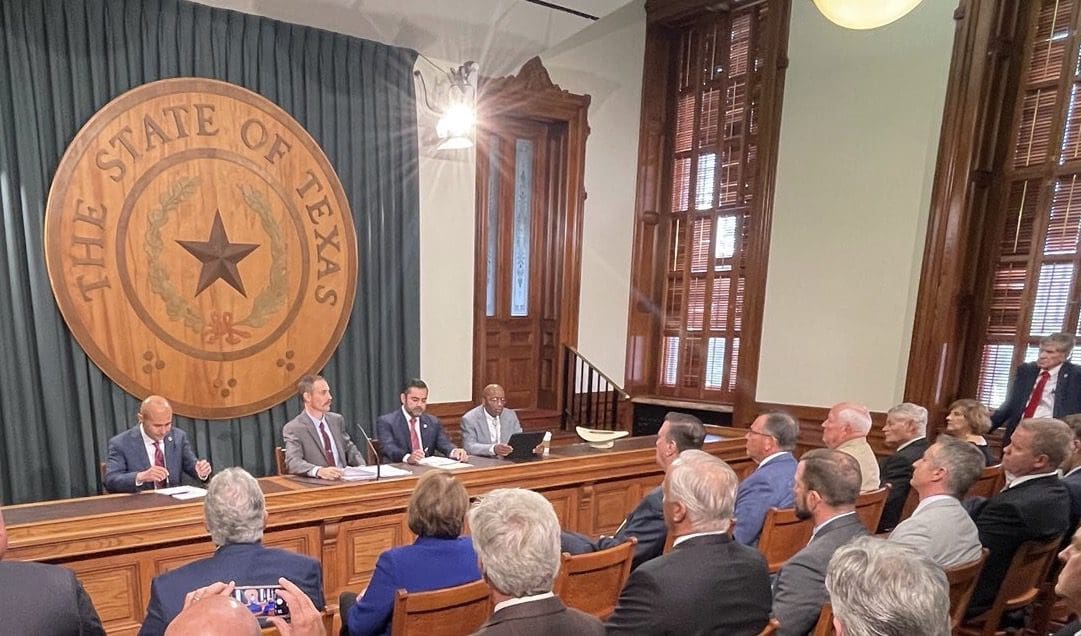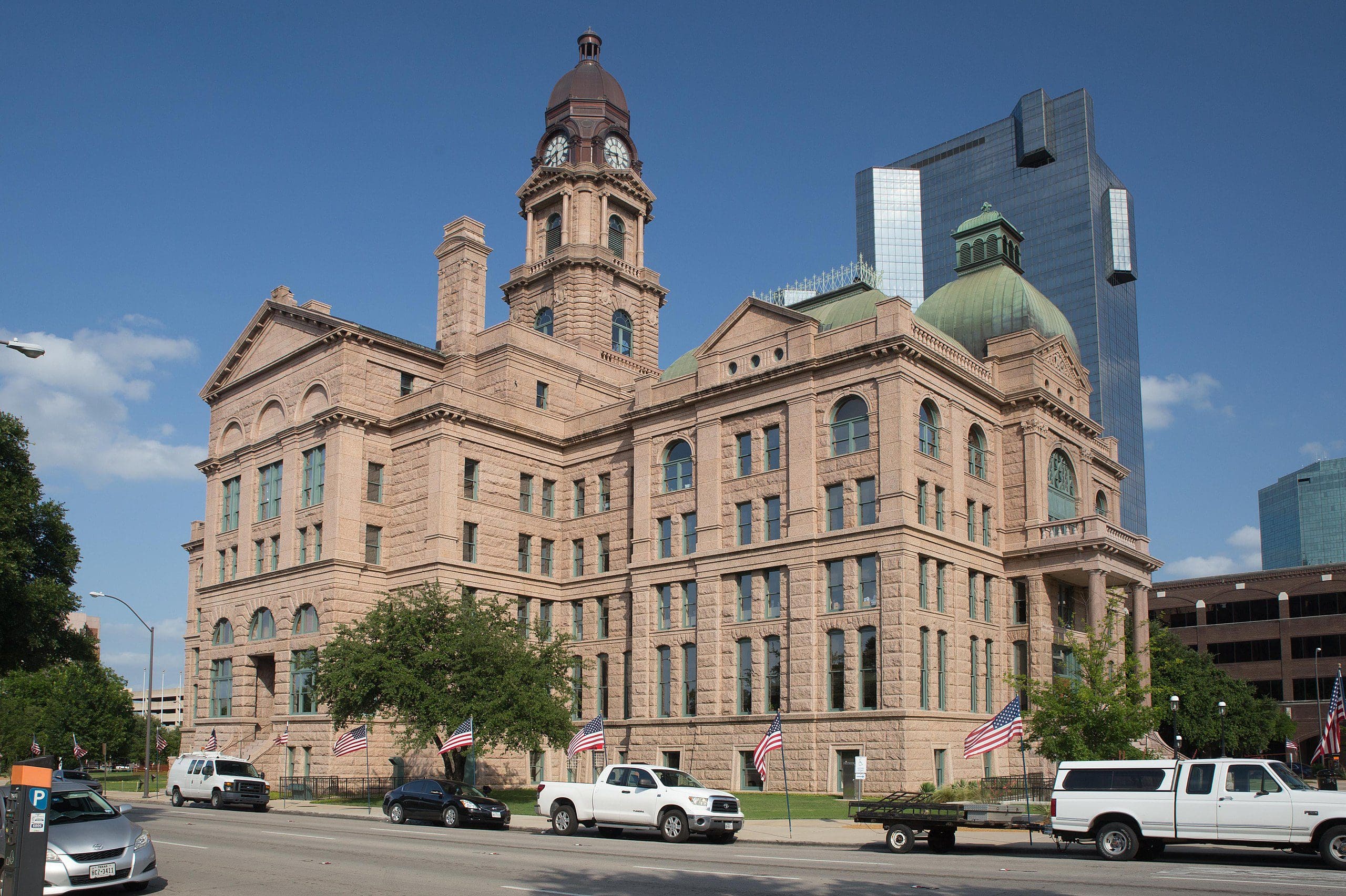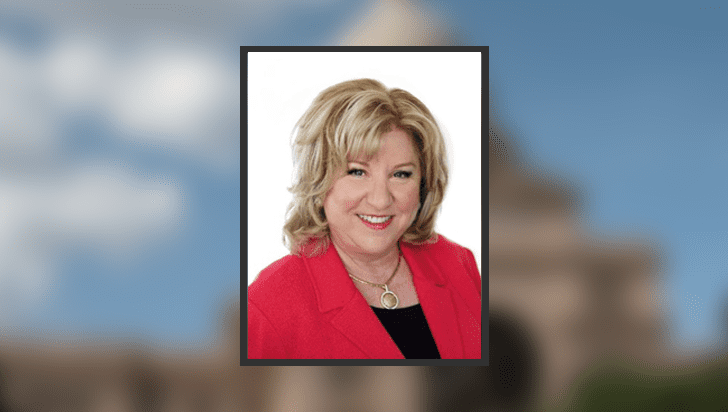Tired of Democrats distorting the contents of election integrity bills and smearing the reforms as racist, Republican lawmakers in the Texas House and Senate shot back last week to set the record straight about what is—and isn’t—included in their proposed legislation.
At the top of their list of what’s not in the bills: “voter suppression.”
“There’s been a lot of misinformation and patently false statements,” State Rep. Andrew Murr (R–Junction) said on Friday at an election integrity briefing held by the House Republican Caucus.
Murr is the author of House Bill 3, a revised version of comprehensive election reform that the Republican-run legislature failed to pass during the 140-day regular session.
Republicans got a second chance to get it right when Gov. Greg Abbott put election integrity on the July special session agenda along with other priorities left undone.
New comprehensive election bills filed in the House and Senate improved on their regular-session counterparts, added items requested by Democrats, and dropped controversial provisions.
The bills still sparked a special session showdown between Democrats determined to block Republicans’ bills by any means, and Republicans who say Democrats haven’t bothered to read the bills and are misrepresenting the reforms.
“Anyone who says there is no voter fraud in Texas is telling a very big lie,” said State Sen. Bryan Hughes (R–Mineola) at a press conference held by Senate Republicans on Wednesday.
Hughes authored Senate Bill 1, an updated version of the comprehensive election reform bill he filed during the regular session that also failed to pass.
He said SB 1 improves both accessibility and security, making it “easy to vote but hard to cheat.”
Though not identical, SB 1 and HB3 are very similar, and they’re much more alike than the regular-session “omnibus” election bills.
The Senate passed the new SB 1 last Tuesday on a party-line vote, following a 14-hour public hearing. HB 3 passed out of committee the weekend before, following an hours-long overnight public hearing.
But both bills are at a standstill due to Democrat lawmakers who fled the state.
More than 50 Texas House Democrats flew to Washington, D.C. last Monday so they could break the 100-member quorum required to conduct House business and at the same time lobby for congressional Democrats’ proposed laws to put state election processes under federal government control.
The Democrats began an anti-election integrity press tour the moment their planes landed in D.C.
As anticipated, they’re complaining that voting rules invented during COVID without legislative oversight are not being made permanent. “Drive-thru” voting, 24-hour voting, unmanned mail-ballot drop boxes, and mass-mailing of unsolicited ballot applications were never used prior to 2020 because they aren’t allowed for in the current Texas code.
Democrats are also calling popular measures like writing a voter ID number on mail-in ballots “racist” and “Jim Crow 2.0”—claims Hughes called “reckless and false.”
“We urge people to look at the provisions of the bill, not the national talking points of D.C.,” Hughes said Wednesday.
Murr also asked people to read the bill.
He detailed Friday what his bill does—and does not—include.
HB 3 does not disenfranchise any voters, Murr said. It also doesn’t:
- overhaul the election system,
- impair anyone’s right to vote,
- make it so fewer people can vote, or
- make it harder for any eligible voter to vote.
The bill also does not allow poll watchers to “intimidate or harass” voters, something already prohibited by current law. Murr noted the purpose of poll watchers is to observe election officials, not voters. “They are the eyes and ears of the candidate or campaign that selects them.”
HB 3 does include provisions that Murr said provide all voters equal access to the polls, reduce the likelihood of fraud, and instill confidence that every legally cast ballot is counted, including:
- more early voting hours (same number of no-excuse early voting days, which some states don’t have at all)
- a minimum of six hours of Sunday voting (up from five) between 9 a.m.-10 p.m.
- time off from work to vote early
- voter ID numbers required on mail-in ballots, same as for in-person voting (superseding signature matches)
- a process for voters to fix mail-ballots errors
- stronger criminalization of paid ballot harvesting and voter assistance fraud
- no third parties pre-filling voter registration applications
- secure handling of electronic election records and materials
- automatic forwarding of voter registration to voter’s new home county
- prioritizing election-related lawsuits for timely resolution
Since the “made-up interpretation” of curbside voting used during COVID wasn’t what the law intended, State Rep. Jacey Jetton (R–Sugar Land) said the bill keeps the current curbside option for eligible voters while ensuring they have an opportunity to cast private votes.
State Rep. J.M. Lozano (R–Kingsville) said he was “sick and tired” of false and “hateful” claims—which get repeated by the media—that election reforms are intended to prevent minorities like him from voting and that its proponents are “racist.”
“Election integrity legislation was not created after 2020,” he said, detailing a long list of bipartisan election reform bills and voter fraud cases going back to the 1990s. “It has been proposed by both Republicans and Democrats in every single state for decades.”
Murr noted election outcomes can be changed by even a small amount of fraud, which occurs most often in smaller and low-turnout local elections and primaries.
Yet Texas Democrats are denying voter fraud is “widespread” enough to warrant stronger laws against paid political operatives who coerce and steal votes for money.
Hughes said Wednesday SB 1 was prompted by complaints about documented cases of election fraud in Texas, including an organized ballot-harvesting prosecution in his district: four suspects charged with 134 counts related to a 2018 Democrat primary decided by five votes.
“This is about protecting voters. Sadly, it’s our most vulnerable voters who are most often preyed upon,” he said. “How much fraud is okay? None. How much suppression is okay? None.”
State Sen. Larry Taylor (R–Friendswood) debunked Democrats’ “Big Lie” claim that the proposed election reforms are just a response to the 2020 presidential election.
“There’s nothing new here except we are finding new ways of fraud happening,” said Taylor, who chaired the House Elections Committee in 2011. “This is not about Trump 2020; this is about what’s right for Texas.”
Republicans have advanced their election reform bills as far as they can for now, as Democrats have ramped up their efforts to demonize the legislation in out-of-state media appearances.
Their PR tour puts all legislation on hold until a sufficient number of Democrat lawmakers return to their jobs. It’s unclear when that will happen.
On Saturday, the House Democrat Caucus announced three of its members who jetted to D.C. had tested positive for COVID-19; by Sunday, they reported two more had tested positive.
Hughes said Republican lawmakers “will stay here for as long as it takes and come back here as many times as it takes.”
Abbott has said he will call special sessions until all his priorities are considered.
As the lawmakers’ standoff continues, election integrity advocates say they’ll continue to counter false talking points promoted in progressive-left media and focus on the bills’ benefits: securing elections with less fraud, without disenfranchising any voters.
In other words, making it easier to vote and harder to cheat.
Details about bills, along with other resources to help citizens engage in the legislative process, are available at Texas Legislature Online. Contact information for elected officials can be found at Texas Directory.





